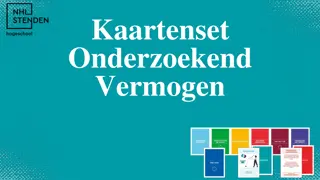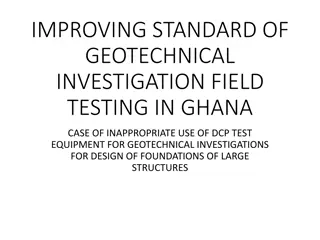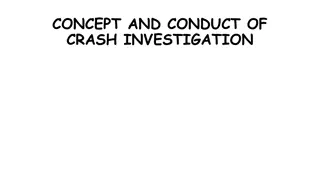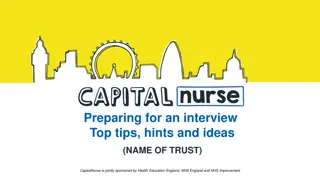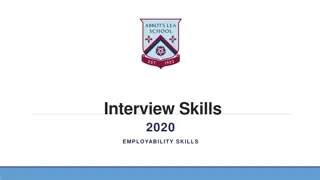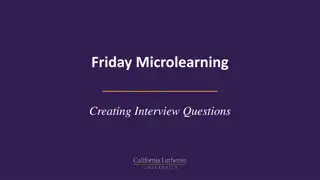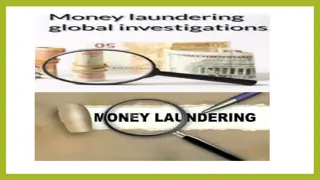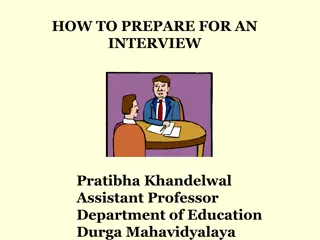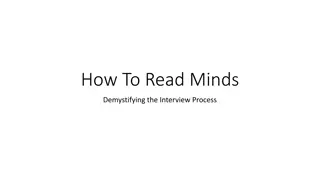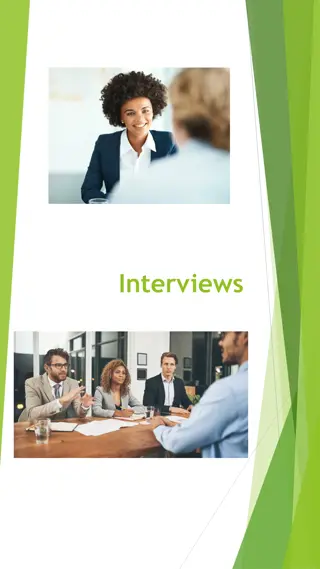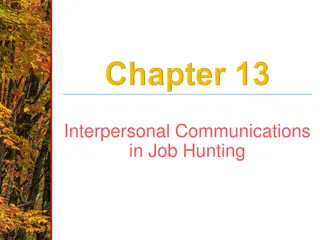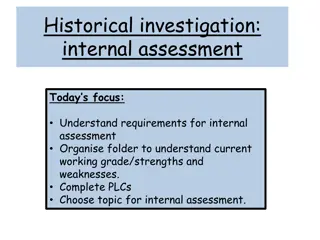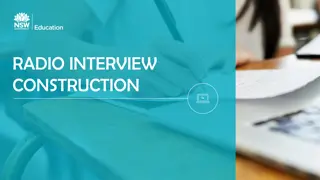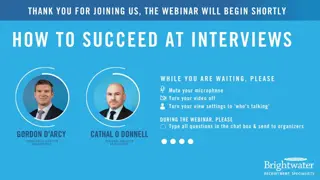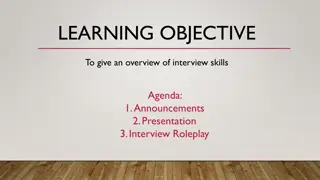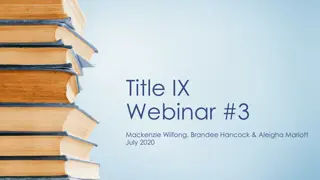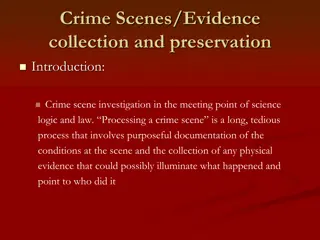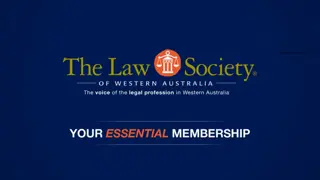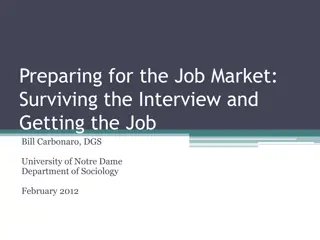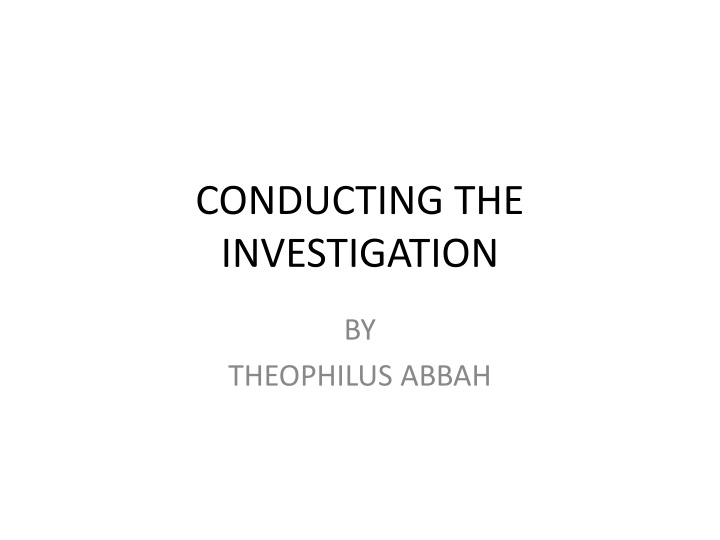
Effective Steps for Conducting an Investigation
Learn about the key steps involved in conducting a successful investigation, from initial research to meeting sources and establishing the case. Discover the tools needed, how to avoid wasted effort, and the importance of broadening contacts with experts.
Download Presentation

Please find below an Image/Link to download the presentation.
The content on the website is provided AS IS for your information and personal use only. It may not be sold, licensed, or shared on other websites without obtaining consent from the author. If you encounter any issues during the download, it is possible that the publisher has removed the file from their server.
You are allowed to download the files provided on this website for personal or commercial use, subject to the condition that they are used lawfully. All files are the property of their respective owners.
The content on the website is provided AS IS for your information and personal use only. It may not be sold, licensed, or shared on other websites without obtaining consent from the author.
E N D
Presentation Transcript
CONDUCTING THE INVESTIGATION BY THEOPHILUS ABBAH
Conducting the Investigation Most brilliant investigative story ideas die at this point. Why? It s a tedious process. Only journalists with commitment and tenacity can go through it. It requires skills It requires commitment to the values behind the story It s a period of temptation
Conducting the Investigation: Tools Needed Pen and/or pencil A notebook A tape and/or video recorder A camera Research skills Filing skill Interviewing skill
Conducting the Investigation The first step usually is to read up what has been published about the story you re investigation: press releases; complaints by persons/organisations; responses in the press; Any professional report on what you want to investigate Using the internet to research the topic
Conducting the Investigation: It is vital to do a lot of background reading because it is possible others may have done the same story; It is possible the questions you intend to ask have been answered, hence you have engaged in a wasted effort; It will enable you to know take the story further add new value to the story. Ask new questions.
Conducting the Investigation Establishing the case: Meeting sources This is the critical point in conducting an investigation. You need to encounter the human, documentary and digital. These sources include: Witnesses: they gave a vivid account of what has happened: In Kogi LG story, we needed workers to tell their stories. And this was not easy.
Establishing to story Current Associates of the subject: other companies officials, shareholders, family members employees, clients, competitors Previous associates: former partners, employees, professional associates. Chains of enquiry: start with anyone who knows a little about the subject matter that you know, and then you get a link to others who know more. Look for experts in the field
Establishing your story A journalist should endeavour to broaden his contact with experts, because you need a lot of them. They are there in universities; professional bodies; retired government officials; self-styled consultants; former ministers in government. Look for more than two experts on the subject matter so that you can have broader perspectives. Some experts are dated; look for current experts as well as older ones.
Establishing your story Government officials: regulatory agencies, police, relevant departments. Obtain relevant documents: minutes of meetings; official reports or decisions; court proceedings; details of registration of companies, etc. But note that government officials are more likely to hide the whole truth from you. International agencies: They have reports, local and international contacts that can help in doing your story, if your report is about their area of specialisation. Shaking the Tree : FAIR manual refers to this as making informal contact with sources, by (i) saying you are doing a story and really need their response (ii) publishing a little bit of the story. At this point sources would come up with additional information.
Establishing your story Blogs, twitter, websites, whistleblowers : Cooking stove not in 2014 budget look up the budget on the Ministry of Finance website; a story about Kogi local councils: look up monthly allocations on Ministry of Finance website; what is government saying on its website? What are critical bloggers saying? What has el-Rufai posted on his website about insurgency? What is Dr Tilde saying about the plight of Fulani in Plateau State? Networking: meeting those who have done this same story or those in the industry related to the story.
Establishing your story Gate-keepers, surveyors, and door-openers : These are individuals within the organisation: secretaries, receptionists, security staff; those who can tell you the structure of things (surveyors); and those who can persuade others to talk to you (elder statesmen; lawmakers; community leaders. In doing debt relief story, a staff in MDG office told me about a water project in Ekiti. Money paid, but the facilitator ran away when an MDG official came for inspection. He also revealed that projects were awarded to PDP members through local chairmen, and not meant to be executed it s money for the boys. This changed the trend of my investigation.
Establishing your story Surveillance and going underground : This should be a kind of last resort because of the legal implications. It should be simply to fill in the gap. It can be dangerous: Emmanuel Mayah had to travel through the desert to Libya while investigating his award-winning human trafficking story! Beware of your source: is he genuine, how adequate is the information he s giving you, what are his motives? Beware of spin doctors official spokesperson and lobbyists: they may not want you to do the story!
You and your source Reluctance/anonymity Payments: Don t pay. If anyone wants money before he speaks, then check the information he wants to give you. But you can pay for lunch or breakfast, or settle some incidental bills, pay translators, or offer support after the interview. Protect your source: Explain what you want to use the information for, who you need to reveal his/her identity to; what to quote and not to quote to ensure he/she is not exposed; make off-record off-record ; conceal his identify if it has been agreed.
How to Protect yourslef It is vital to let your superior and colleagues know you re doing the story. Don t be too secretive about it. If you re working as an undercover, tell your editor what you experience at every step. Find out where to locate the nearest police station, in case you run into trouble. Have a reserve (undisclosed) handset, fully charged with enough credit balance, to enable you make secret calls. Secure all vital documents obtained from sources: photocopy and keep original in company s safe. Agree on how to protect your source, but don t allow the source to determine how the story should be done. Record all conversations with sources (both on record and off-the- record). Transcribe them and store in your computer. Seek help when necessary from security agencies when necessary.
Using Documentary Evidence As mentioned earlier, there are a lot of documents in circulation about the story you re doing. You need them as backgrounders. But also, you need documents concerning the story in order to authenticate what you re doing. How much is the contract? There has to be signed documents. How much tax did Dangote Cement company pay in 2013? N20 million. There has to be the company s Balance Sheet or tax receipt? Insist on documentary evidence for your story, not just hearsay. But you must learn to evaluate the documents, using basic skills that forensic experts apply. Journalists must insist on accessing authentic documents.
Evaluating Documentary Evidence Question the source of the document. What might be the motives of the person for providing documents? (Example of Primary Healthcare). Is he a competitor? Is he seeking a job and was denied a place? Is the document genuine? The letterhead, any verifiable names quoted, whether the date makes sense; the language of the document: obvious grammatical errors; official stamp, is it authentic? Civil servants forge documents (NNPC and oil import document story) Is the document complete? Pages may be missing. Has anything been erased, scratched out or rendered unreadable. The missing information could put a completely new face on what is read. How current is the information? Ask someone familiar with the issues to verify that it is an up-to-date document, not an old one that has been overtaken by events. Is it accurate: ask others who may know whether the facts and figures seem likely, or cross-check them with other documents. Documents can lead to other documents. Try and follow the paper trails. (Example of aviation fraud between a former managing director of FAAN and a former minister of aviation).
Conducting the Investigative Interview Do a thorough background reading: get your facts before going for the interview. Get correct names, Prepare your questions in advance: Be ready to ask the critical question: Minister of Environment: Is the N9.2bn contract on cooking stove in 2014 budget? (you already know its not), you broke the law, Mr Minister? The soft and hot questions: get them ready Ask pointed and specific questions Confirm what is on the record and off the record. Don t conceal recording devices. Take notes. Confirm questions and answers Let the interviewee make his point. Let him complete his statements, even if he paused. Don t rush to make comments, or claim to know as much as the interviewee. Don t allow him to read your story before you publish it.
Go There You can t feel a story until you have gone to where the action is. Don t trust what others tell you so much. Do the work of a reporter. Seek for proofs.

